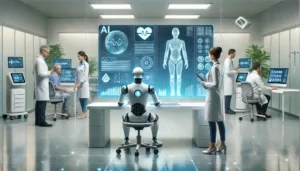
Medical professionals and mental health practitioners should stand to benefit from AI as much, if not more, than people in other professions. Our founder spent time as an EMT and noted that even there he created a mountain of paperwork constantly; a member of our team has worked with therapists and psychiatrists for years and seen their 90%-filing-cabinet offices.
Paperwork is exactly the sort of thing AI should be taking care of!
Imagine if you could shave even 20% of your administrative time off. You might actually get to leave work on time for once or get through your client backlog.
However, as I’m sure you know, AI shouldn’t be thoughtlessly handed sensitive information. This means that, until now, it was almost impossible to use it to help out around the office as a psychiatrist, therapist, or nurse.
Infuzu has stepped in to help. Our product is fully HIPPA-compliant, meaning you can use it for sensitive work without having to stress much about what might go wrong.
If you are a healthcare worker looking to use AI, these are 3 approaches you should take to ensure secure and optimal AI use.
Number 1: Treat AI like a friend in every way.
LLM chatbots are not Google. You don’t have to “use Google-fu” or intricately engineer your prompts. As a matter of fact, we believe it’s best practice to speak to chatbots the same way you would speak to a friend.
That being said, you must be aware who you are sharing information with. Unless you are using a product that is HIPAA compliant and you or your employer has a signed Business Associate Agreement (BAA) with you, you cannot share any Protected Health Information (PHI) with that product. This means that for non-HIPAA compliant products like ChatGPT, you must remove any PHI from your queries before asking questions.
Infuzu will happily sign BAAs and uses private cryptography with no plain-text data storage. This means that we can safely handle private information, the same way a coworker who has sworn the same oath as you might.
Number 2: AI isn’t intelligent enough to make decisions.
AI processes data and returns a product which is in line with that data; this is a similar “thought process” to a person who has just started in a field; they’ve maybe taken one class and they’re basing everything on that.
With that in mind, it’s important that AI isn’t allowed to make any truly important decisions. It might make the right decision sometimes, but it won’t do it for the right reasons. This will inevitably cause issues.
Instead, delegate to AI the way you might delegate to an intern. Ask it to make decisions which aren’t very sensitive or otherwise critical, and give it all the information that it will need to make a decision when asked.
Number 3: AI is a tool, not a replacement.
Similarly, you should not expect AI to do its job to the standard of quality that an industry professional would. Even a basic email written by AI, which won’t have any glaring issues, might have small changes that you’ll want to make. Make sure that you are still going over AI work to ensure that it’s up to par.
This should also inform when in a process you employ AI. For now, at least, it is not a replacement for most work. Instead, AI is a tool that should be used to grease the wheels in any mental process that you are stuck on. You might ask it to outline an article (as I did here) or to produce a draft of an email or grant.
On the other hand, work which doesn’t require much subjectivity can usually be run through AI just fine. Meeting notes, for example, can be easily organized and summarized without having to stress much if anything is wrong.
Each of these cases exemplifies the true strength of AI: it is fantastic at creating information for expert eyes to employ in their job.
So, AI will not suddenly solve every paperwork problem you might have. However, it can do much of the time-consuming work in fractions of a second. A client offered that they used Infuzu to draft a treatment plan, which would have taken them 2 hours total on their own, and with Infuzu’s help, they managed to finish work in 30 minutes and 0.000158 seconds.
AI chatbots, when used responsibly, make life much easier.
Sign up for Infuzu today for HIPPA-compliant, full-spread AI chatbot access.





